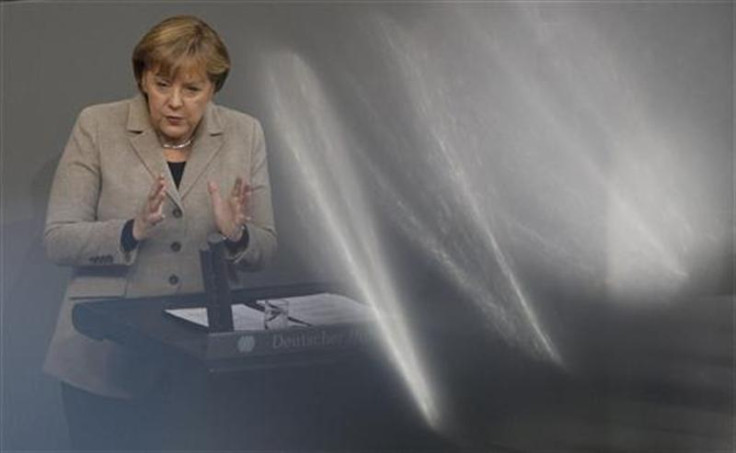Mrs Merkel Takes on the Ratings Agencies

Mrs Merkel on 02 December 2011:
"We have started a new phase in European integration. There are no quick and easy answers. Resolving the sovereign debt crisis is a process and this process will take years."
You'll have to shout, Mrs Merkel, because either the Markets didn't hear you or they have totally ignored your message.
On Friday, 18 December, the "I" reported that on the previous day, German Chancellor Angela Merkel had restated her opposition to the European Central Bank (ECB) becoming a lender of last resort stating::
"If politicians think that the ECB can solve the problems of the Eurozone, they are kidding themselves."
She went on to insist that greater budgetary integration was required within the Eurozone countries and was fully supported by her Deputy who claimed to be baffled that the British didn't seem to have a clear view of the, presumably dire, consequences that a collapse of the Euro would bring about to the City of London.
Meanwhile, in Milan, Italy's new Prime Minister, Mario Monti, prepared to outline further cuts and reforms - over and above those promised by his predecessor, Silvio Berlusconi - pledging to "...bring his country's finances in order."
The seriousness of the Eurozone crisis in particular and sovereign debt crisis in general, is forcing the governments of the European Union to face the awful prospect of a possible collapse of the Euro. Yet after swathes of austerity programmes that have been passed by several EU parliaments, and have been felt for some time in the likes of Ireland and not forgetting Greece, both Eurozone members, and just starting to bite in the UK, famously not in that club, the Markets remain unimpressed.
I don't think I agree with Norman Lamont, an ex-Chancellor of the Exchequer who saw the withdrawal of Britain in 1992 from the Euro's forerunner, the Exchange Rate Mechanism (ERM), who said last week that the Eurozone "is in a state of denial about the scope and extent of the crisis." If nothing else has made the Eurozone members aware of the seriousness of the situation, it is the threat of their credit ratings being downgraded, especially the bigger countries/economies of Italy, Spain and France, by the ratings agencies. A downgrade almost certainly impacting unfavourably on their respective costs of borrowing.
Concentrating minds even further will be the summary of Fitch Ratings. The Guardian on 16 December, reported that Fitch Ratings was placing Belgium, Spain, Slovenia, Italy, Ireland and Cyprus, all on Rating Watch Negative (RWN). Each of these countries is on "active review" and any decision to affect a down/grade change is expected by the end of January 2012. This follows on from the Brussels summit on 09-10 December, with Fitch concluding that a "...comprehensive solution to the Eurozone crisis is technically and politically beyond reach."
No mention of France in Fitch's list so let's hope that the spat between French and British politicians as to which country is more deserving of its present credit rating is just an amusing aside and the leaders of both can concentrate their efforts solving the crisis at hand.
The Brussels Summit was meant to present an EU united front and will probably become more famous for British Prime Minister, David Cameron using his veto by not allowing proposed changes put forward by France and Germany, to be embedded within the current EU Treaty. Mr Cameron used the veto because they were against the interests of the UK and City of London and would also have imposed a new "transaction tax" on all EU members, irrespective of whether or not the country is a member of the Eurozone.
It would be wrong to conclude however, that Britain's veto bore a major influence on Fitch's actions. The Agency noted the positive commitments made by the EU leaders, was pleased that less emphasis was now being placed on private sector involvement, and that the creation of the European Stability Mechanism - with a fund of €500 billion - will be brought forward to mid-2012.
The fly in the ointment? Why, it's that old stumbling block in the eyes of Germany especially, of the role played by the European Central Bank and the "...absence of a credible financial backstop". As Fitch sees it:
"...this requires more active and explicit commitment from the ECB to mitigate the risk of self-fulfilling liquidity crises..."
Even ones which might affect solvent Euro members.
Dancing to a different tune from 20 December , negotiations will continue until March 2012 through the European Court of Justice on a draft proposal for the new economic disciplines that are intended to be binding on the 17 Eurozone member states and which any other country in the EU but not at the moment in the Eurozone will be invited to sign.
Now, maximum three per cent deficit to GDP ratio .....there's a ring of familiarity, BUT THIS TIME IT'S SERIOUS!
© Copyright IBTimes 2025. All rights reserved.






















